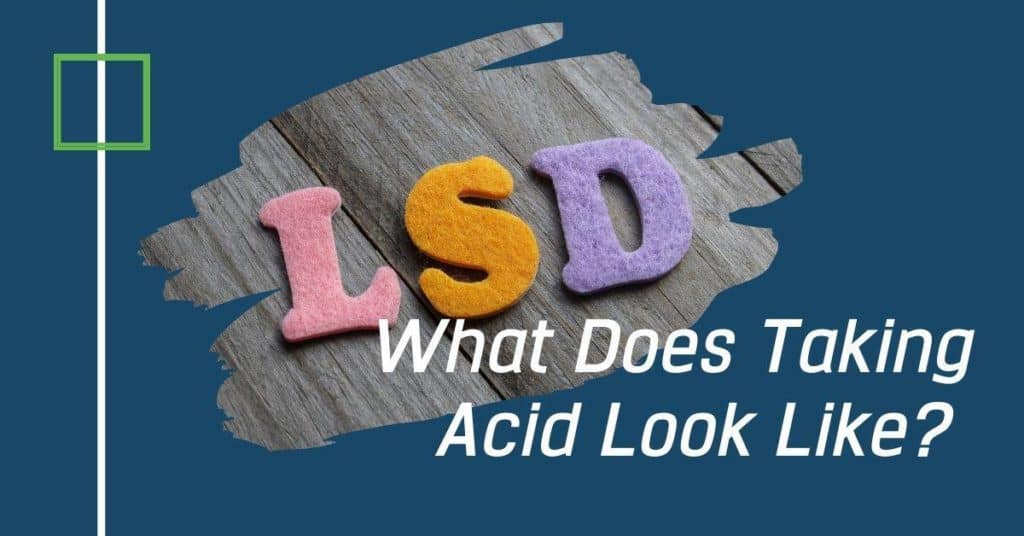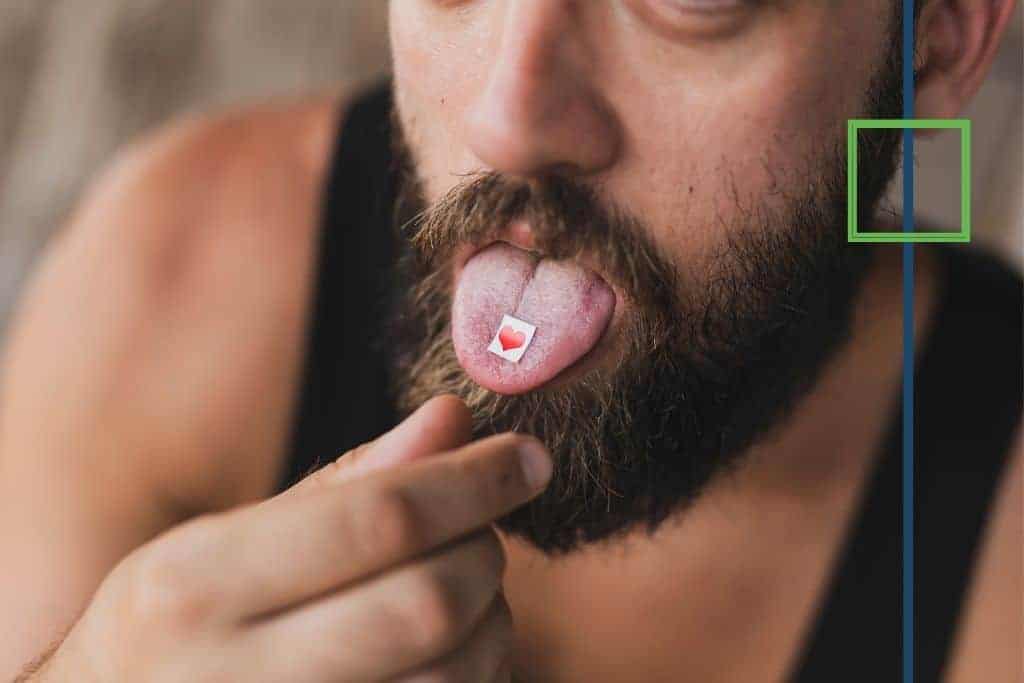LSD Withdrawal
Lysergic acid diethylamide (LSD) is an extremely powerful psychedelic drug synthesized from ergot, a fungus that commonly grows on rye and other grains. Its hallucinogenic properties are so powerful that people measure their dosage in micrograms. As little as 25ug to 75ug, which users describe as a “mild experience,” can cause visual hallucinations, while a 700-1000ug can induce a “full out-of-body experience [1].” LSD, however, in some cases, has the potential to cause psychological issues – especially in people with psychosis, schizophrenia, or a family history of mental illness. LSD may actually exacerbate these conditions. The US DEA classifies LSD as an illegal Schedule 1 controlled substance, which is very likely to be abused and doesn’t have any documented use in medical treatments.
LSD works by stimulating the serotonin (brain chemical) production in the cortex and deep structures of the brain, by activating serotonin receptors. These serotonin receptors help interpret and visualize the real world. The additional serotonin allows more stimuli to be processed than usual.
The brain filters out irrelevant stimuli, but with LSD this is not the case [2]. This overstimulation causes changes in thought, perceptions, attention, and emotions. These alterations appear as hallucinations. Sensations seem real, but they are hallucinations created by the mind.

The perceptions can involve one or more of the five senses. It can also cause the blending of the senses, known as synesthesia. For example, some people report “hearing” colors and “seeing” sounds. Users of LSD talk about good or bad “trips,” or experiences. LSD isn’t considered physically addictive. Though it’s a powerful drug with very serious physical and mental effects, the body doesn’t become dependent upon its presence. When a person abuses LSD, they may develop a psychological dependence on it, so most withdrawal symptoms are mental or emotional in nature.

Get Your Life Back
Find Hope & Recovery. Get Safe Comfortable Detox, Addiction Rehab & Dual Diagnosis High-Quality Care.
Hotline(844) 597-1011Withdrawal Symptoms of LSD
The common symptoms of LSD withdrawal, particularly in individuals who have repeatedly taken high doses of the drug, include:
- Lack of concentration: When a person stops LSD use, it can be difficult to concentrate. It can take several weeks for a normal level of attention to be regained.
- Anxiety: Individuals may feel a general sense of anxiety. When they’re withdrawing from this drug, their anxiety may also be focused on their use of the drug and its potential impact on their brain or health.
- Depersonalization: This word refers to the altered sense of reality LSD users often encounter while taking the drug. It can also happen after they’ve taken their last dose of LSD. It can be challenging for the person to distinguish between reality and the experience of a trip, so depersonalization can be part of that transition as someone stops using the drug.
- Confusion: One of the most common LSD withdrawal symptoms is a sense of confusion. It can be hard to separate real life from hallucinations, and it can take several days for cognitive function to return to normal.
- Flashbacks: Flashbacks are episodes where a person who previously used LSD begins to experience things they did during their trips, including the emotions and hallucinations involved.

Withdrawal Effects of LSD
These are just a few of the things that may happen when a person experiences LSD withdrawal symptoms, especially if they recently used the drug and immediately entered a detox or treatment program afterward. These LSD withdrawal symptoms often go away after a period of days or weeks. An individual can theoretically withdraw from LSD cold turkey, but due to the potential for emotional and mental disturbances, it is often best to seek professional help to manage the resulting effects.
Also, many people are wondering if it’s possible to die from LSD withdrawal. The answer is generally no, as there aren’t physical LSD withdrawal symptoms. However, death could happen inadvertently as the result of side effects like psychosis suicidal thoughts, and psychosis, which could change the behavior of the user.
Get Help. Get Better. Get Your Life Back.
Searching for Accredited Drug and Alcohol Rehab Centers Near You?
Even if you have failed previously and relapsed, or are in the middle of a difficult crisis, we stand ready to support you. Our trusted behavioral health specialists will not give up on you. When you feel ready or just want someone to speak to about therapy alternatives to change your life call us. Even if we cannot assist you, we will lead you to wherever you can get support. There is no obligation. Call our hotline today.
(844) 597-1011LSD Withdrawal Timeline
Since LSD withdrawal causes severe but varying psychological effects, the timeline for someone to experience LSD withdrawal symptoms will be largely subjective. It may depend on a few personal factors such as the size of the dose you used, how long you used LSD consistently, and the existence of any mental health problems.
If you stop using LSD after developing a psychological dependence, you might experience some discomfort over the next few days. LSD withdrawal symptoms like insomnia and anxiety may appear and disappear during that time. LSD withdrawal symptoms may also linger if they triggered underlying mental health issues like anxiety or depression. Drug use, in general, can be more dangerous for individuals with mental health conditions. The long-term effects of LSD may not subside on their own without medical treatment.
How Long Does LSD Withdrawal Typically Last?
There is no set time for LSD withdrawal symptoms, nor are there specific LSD withdrawal medication options. Many individuals, particularly first-time or infrequent users, may experience no LSD withdrawal symptoms at all. During the withdrawal experience from LSD, some individuals may have symptoms similar to schizophrenia, such as bizarre behaviors or paranoia. Everyone’s brain is different, which is why there are so many different experiences with LSD use and withdrawal from it.
First-class Facilities & Amenities
World-class High-Quality Addiction & Mental Health Rehabilitation Treatment
Rehab Centers TourRenowned Addiction Centers. Serene Private Facilities. Inpatient rehab programs vary.
Addiction Helpline(844) 597-1011Proven recovery success experience, backed by a Team w/ History of:
15+
Years of Unified Experience
100s
5-Star Reviews Across Our Centers
10K
Recovery Success Stories Across Our Network
- Low Patient to Therapist Ratio
- Onsite Medical Detox Center
- Comprehensive Dual-Diagnosis Treatment
- Complimentary Family & Alumni Programs
- Coaching, Recovery & Personal Development Events
LSD Withdrawal Remedies & Medications
With many addictive illicit and prescription drugs, there are medications that can be given to a person during the detox and withdrawal periods. The medication helps ease symptoms and allows the body to manage physical discomfort. This is not the case with LSD withdrawal because this drug is not physically addictive.
There aren’t specific LSD withdrawal medication options. If a person is under medical supervision during LSD withdrawal, however, they might be given antidepressants or other medications that can help relieve psychological LSD withdrawal symptoms. By taking drugs to help with their mental state, a person can begin to normalize and start moving toward recovery.
Medications for LSD withdrawal symptoms can be particularly important if someone is experiencing rare symptoms like suicidal thoughts or psychosis. These symptoms are most predominant among heavy and frequent users of LSD. One study found that clonazepam was effective for treating symptoms of HPPD among people withdrawing from LSD. ‘Hallucinogen persisting perception disorder (HPPD) can cause someone to suffer from visual disturbances and a recurrence of hallucinations for a year or more after LSD use is discontinued.
Finding an Accredited Detox Facility
Often, people will feel like they’re moving toward feelings of anxiety, hopelessness, depression, or even paranoia as the result of long-term and frequent use of this drug. For these reasons, they may decide medical detox and treatment for LSD are the right options for them. At a medical detox center, a team of highly trained professionals shows patients how to detox from LSD safely.

The LSD detox protocol should be highly individualized, as the effects of LSD are unique for everyone. A medical detox center can help clients cope with the LSD withdrawal symptoms they’re experiencing. Many clients will enter an LSD detox center while they’re still feeling the effects of the drug, so the medical team will work to stabilize the person mentally and physically.
For someone experiencing a “bad trip” or persistent effects of LSD abuse, medical detox could include the administration of anxiety medication to alleviate feelings like panic or terror. There may also be the need to administer antipsychotic tranquilizers during medical detox, but this is only in very serious situations where a person could potentially harm others or themselves.
Once the initial effects of LSD withdrawal symptoms are dealt with and LSD withdrawal symptoms are effectively managed, the patient would transition to LSD treatment programs to help them quit using LSD altogether. This can include cognitive-behavioral therapy and a combination of group and individual therapy. Through these, the clients will learn about various coping mechanisms that can help in social situations and everyday life.
World-class, Accredited, 5-Star Reviewed, Effective Addiction & Mental Health Programs. Complete Behavioral Health Inpatient Rehab, Detox plus Co-occuring Disorders Therapy.
CALL(844) 597-1011End the Addiction Pain. End the Emotional Rollercoaster. Get Your Life Back. Start Drug, Alcohol & Dual Diagnosis Mental Health Treatment Now. Get Free No-obligation Guidance by Substance Abuse Specialists Who Understand Addiction & Mental Health Recovery & Know How to Help.
LSD Addiction Treatment
There is a strong link between mental health conditions, such as anxiety disorder and LSD addiction. Individuals who struggle with mood disorders like anxiety are more susceptible to developing an addiction to drugs, often to self-medicate symptoms of their underlying mental health condition. These co-occurring disorders can make each other worse without proper treatment.
Mixing LSD and alcohol increases the risk of overdose and death. Alcohol consumption further increases the unpredictability of LSD and worsens its adverse effects. The use of alcohol and LSD, or the use of more than one drug, also known as polysubstance use, is common. This includes when two or more are taken together or within a short time period, either intentionally or unintentionally.
To determine the most effective ways to treat LSD withdrawal symptoms, it’s crucial to first get an accurate assessment of all the symptoms. When the symptoms have been evaluated by a mental health professional, it may be determined that another form of mental condition is present and needs a particular type of treatment. Very often, some combination of psychotherapy, medication, and/or lifestyle changes are effective for coping with functional.
Medically-Assisted Detox
Medical detox is often considered the first stage of treatment. It will help you navigate the complicated process of withdrawal, but it doesn’t address patterns of thought and behavior that contribute to drug abuse. Various treatment approaches and settings can help provide the ongoing support necessary to maintain long-term sobriety after you complete detox.
Cravings are very common during detox and can be challenging to overcome. This often leads to relapse. Constant medical care provided during inpatient drug rehab helps prevent relapse. Clinicians can provide necessary medication and medical expertise to lessen cravings and the effects of withdrawals.
Psychotherapy for Depression and Anxiety
Several different modalities of psychotherapy have been used in the treatment of depression including:
- Cognitive Behavioral Therapy (CBT) – is an effective treatment that involves making changes in both the patterns of negative thoughts and the behavioral routines which are affecting the daily life of the depressed person for various forms of depression.
- Dialectical Behavioral Therapy – is a comprehensive mental health and substance abuse treatment program whose ultimate goal is to aid patients in their efforts to build a life worth living. The main goal of DBT is to help a person develop what is referred to as a “clear mind.”
- Person-Centered Therapy – is a strategy that allows and encourages clients to understand and resolve their concerns in a safe, supportive environment.
- Solution Focused Therapy – is an approach interested in solutions that can be quickly implemented with a simple first step leading to further positive consequences.
Dual Diagnosis Treatment Center
Substance abuse and mental health disorders often co-occur. In many cases, traumatic experiences can result in a mental health disorder and substance abuse. Dual diagnosis rehabilitation treats both of these issues together. The best approach for the treatment of dual diagnosis is an integrated system. In this strategy, both the substance abuse problem and the mental disorder are treated simultaneously. Regardless of which diagnosis (mental health or substance abuse problem) came first, long-term recovery will depend largely on the treatment for both disorders done by the same team or provider.
Medication-Assisted Treatments
Medication-Assisted Treatments (MAT) for substance use disorders and mental health disorders are commonly used in conjunction with one another. This includes the use of medications and other medical procedures. During your rehab, the staff from your treatment facility will help you identify what caused your addiction and teach you skills that will help you change your behavior patterns and challenge the negative thoughts that led to your addiction.
Sometimes, the pressures and problems in your life lead you to rely on substances to help you forget about them momentarily. If you or a loved one are struggling with long-term LSD abuse and anxiety problems, contact one of our helpful treatment specialists today. We Level Up can provide information on dual diagnosis and detox programs that may fit your needs.

Experience Transformative Recovery at We Level Up Treatment Centers.
See our authentic success stories. Get inspired. Get the help you deserve.
Start a New Life
Begin with a free call to an addiction & behavioral health treatment advisor. Learn more about our dual-diagnosis programs. The We Level Up Treatment Center Network delivers recovery programs that vary by each treatment facility. Call to learn more.
- Personalized Care
- Caring Accountable Staff
- World-class Amenities
- Licensed & Accredited
- Renowned w/ 100s 5-Star Reviews
We’ll Call You
Sources
[1] [3] NIDA – https://archives.drugabuse.gov/publications/nida-community-drug-alert-bulletin-club-drugs/lysergic-acid-diethylamide-lsd
[2] NIDA – https://nida.nih.gov/publications/drugfacts/hallucinogens
[3] How Long Does LSD Stay In Your System? – We Level Up NJ


